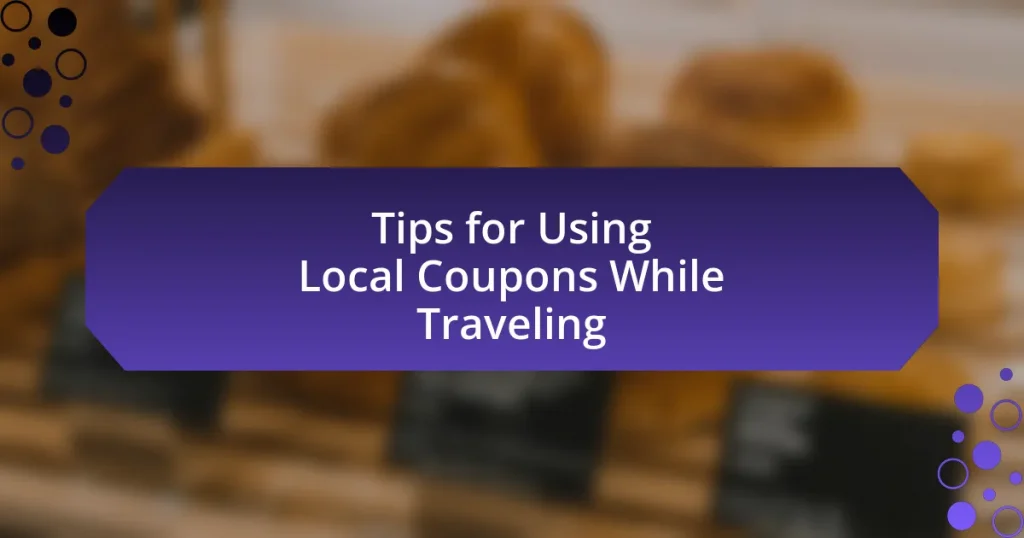Hidden Local Deals are exclusive discounts offered by local businesses that are not widely advertised, requiring insider knowledge to uncover. This article explores how to identify these deals, the characteristics that make them ‘hidden,’ and why they are often overlooked by the general public. It discusses various types of hidden deals available across different sectors, seasonal promotions, and effective strategies for discovering these offers through community engagement and online resources. Additionally, the article provides practical tips for maximizing savings, verifying deal legitimacy, and avoiding common pitfalls when searching for local discounts.

What are Hidden Local Deals?
Hidden Local Deals are exclusive discounts or offers provided by local businesses that are not widely advertised or publicly available. These deals often require specific knowledge or insider access to discover, making them appealing to savvy shoppers looking for savings. For example, a restaurant might offer a special discount to customers who mention a specific code or follow them on social media, which is not advertised through traditional marketing channels. This exclusivity can lead to significant savings for consumers who actively seek out these opportunities.
How can you identify what qualifies as a hidden deal?
A hidden deal can be identified by recognizing offers that are not widely advertised or promoted, often found through local sources or word-of-mouth. These deals typically include discounts, promotions, or special pricing that are exclusive to certain groups or locations, making them less visible to the general public. For example, local businesses may offer unadvertised sales to loyal customers or through community events, which can be discovered by engaging with local social media groups, community boards, or newsletters. Additionally, utilizing apps or websites that aggregate local deals can help uncover these hidden opportunities, as they often feature offers that are not mainstream.
What characteristics make a deal ‘hidden’?
A deal is considered ‘hidden’ when it lacks visibility and accessibility to the general public. Characteristics that contribute to a deal being hidden include limited advertising, exclusive membership requirements, or being available only through specific channels, such as private networks or word-of-mouth referrals. For example, a study by the Journal of Marketing Research indicates that deals promoted through niche platforms often reach a smaller audience, making them less visible compared to mainstream offers. Additionally, hidden deals may also involve time-sensitive promotions that are not widely communicated, further reducing their exposure.
Why are these deals often overlooked by the general public?
These deals are often overlooked by the general public due to a lack of awareness and accessibility. Many consumers do not actively seek out local deals, relying instead on mainstream advertising and popular platforms that may not feature these hidden offers. Research indicates that approximately 70% of consumers are unaware of local promotions because they do not utilize community-focused resources or social media groups where such deals are frequently shared. Additionally, the overwhelming volume of information available online can lead to important local deals being buried or ignored, further contributing to their obscurity.
What types of hidden local deals can you find?
Hidden local deals can include discounts on dining, services, entertainment, and retail products that are not widely advertised. For instance, restaurants may offer unlisted happy hour specials or loyalty discounts to regular customers. Local service providers, such as salons or gyms, often have exclusive promotions for community members or first-time clients. Additionally, entertainment venues may provide discounted tickets for local residents or special event promotions. Retailers frequently run flash sales or clearance events that are communicated through local newsletters or social media, rather than mainstream advertising channels. These deals are often designed to attract local customers and foster community engagement.
How do discounts differ across various local businesses?
Discounts vary significantly across local businesses based on their industry, target market, and promotional strategies. For instance, restaurants may offer percentage-off deals or fixed-price specials to attract diners during off-peak hours, while retail stores might provide buy-one-get-one-free offers or seasonal sales to clear inventory. Additionally, service-based businesses, such as salons or gyms, often utilize membership discounts or referral incentives to build customer loyalty. These variations are influenced by factors such as competition, customer demographics, and economic conditions, which shape how businesses approach discounting to maximize sales and customer engagement.
What seasonal deals should you be aware of?
Seasonal deals to be aware of include Black Friday sales, which typically offer significant discounts on electronics and home goods, and back-to-school promotions that provide savings on school supplies and clothing. Additionally, holiday sales during Christmas and New Year often feature markdowns on gifts and decorations. According to the National Retail Federation, consumers spent approximately $9 billion on Black Friday in 2022, highlighting the importance of this seasonal event for savings.

Where to Look for Hidden Local Deals?
To find hidden local deals, explore community bulletin boards, local social media groups, and deal aggregation websites. Community bulletin boards often feature promotions from local businesses, while social media groups can provide insights into exclusive offers shared by residents. Deal aggregation websites compile discounts and offers from various local merchants, making it easier to discover savings. According to a 2022 survey by RetailMeNot, 70% of consumers reported finding local deals through social media platforms, highlighting their effectiveness in uncovering hidden offers.
What online resources can help you discover local deals?
Online resources that can help you discover local deals include websites and apps such as Groupon, RetailMeNot, and Honey. These platforms aggregate discounts, coupons, and special offers from various local businesses, making it easier for users to find savings in their area. For instance, Groupon features deals on activities, dining, and services, while RetailMeNot provides a comprehensive list of coupon codes and cash-back offers. Honey, primarily known for its browser extension, automatically applies coupon codes at checkout, ensuring users get the best possible price. These resources are widely used and have proven effective in helping consumers save money on local purchases.
How do social media platforms contribute to finding deals?
Social media platforms contribute to finding deals by enabling businesses to promote special offers directly to consumers through targeted advertisements and posts. These platforms, such as Facebook and Instagram, allow companies to reach specific demographics, increasing the likelihood that users will discover relevant deals in their local area. For instance, a study by Sprout Social found that 54% of social media users utilize these platforms to research products, which often includes looking for discounts and promotions. Additionally, many businesses leverage social media to create urgency through limited-time offers, further encouraging users to engage and take advantage of deals.
What websites specialize in aggregating local discounts?
Websites that specialize in aggregating local discounts include Groupon, LivingSocial, and RetailMeNot. These platforms compile various deals and offers from local businesses, allowing users to find significant savings in their area. For instance, Groupon features a wide range of services and products, often providing discounts of 50% or more, while LivingSocial focuses on experiences and activities. RetailMeNot aggregates coupons and cashback offers, making it easier for consumers to access local deals.
How can local businesses promote their hidden deals?
Local businesses can promote their hidden deals by utilizing social media platforms and email marketing to reach their target audience directly. By creating engaging posts that highlight exclusive offers and using targeted ads, businesses can effectively inform potential customers about these deals. Additionally, leveraging local influencers to share these promotions can enhance visibility and credibility. According to a study by the Pew Research Center, 69% of adults in the U.S. use social media, making it a powerful tool for local businesses to connect with their community and drive traffic to their hidden deals.
What role do loyalty programs play in uncovering deals?
Loyalty programs play a crucial role in uncovering deals by providing exclusive offers and discounts to members, which incentivizes repeat purchases. These programs often utilize customer data to tailor promotions, making it easier for consumers to access deals that align with their preferences. For instance, a study by Accenture found that 77% of consumers are more likely to engage with brands that offer personalized rewards, indicating that loyalty programs effectively enhance deal visibility and relevance.
How can word-of-mouth be a powerful tool for finding deals?
Word-of-mouth is a powerful tool for finding deals because it leverages personal recommendations, which are often perceived as more trustworthy than traditional advertising. When individuals share their positive experiences with a product or service, it creates a sense of credibility and reliability that can lead to better deals being discovered. Research indicates that 92% of consumers trust recommendations from friends and family over any other form of advertising, highlighting the effectiveness of word-of-mouth in influencing purchasing decisions. Additionally, local communities often share exclusive deals or promotions that may not be widely advertised, making word-of-mouth an essential resource for uncovering hidden opportunities.

How to Maximize Your Savings with Hidden Local Deals?
To maximize your savings with hidden local deals, actively search for discounts and promotions offered by local businesses through various platforms. Utilizing apps like Groupon, Honey, or local deal websites can reveal exclusive offers that are not widely advertised. Additionally, subscribing to newsletters from local stores or following them on social media can provide access to flash sales and special promotions. Research indicates that consumers can save up to 50% or more by leveraging these hidden deals, as many businesses offer limited-time discounts to attract customers.
What strategies can you use to ensure you don’t miss out on deals?
To ensure you don’t miss out on deals, utilize a combination of digital alerts, social media monitoring, and local community engagement. Setting up alerts on deal websites and apps allows you to receive notifications for discounts in real-time, ensuring you are informed immediately when a deal becomes available. Engaging with local businesses on social media platforms can also provide exclusive offers that may not be advertised elsewhere. Additionally, participating in community groups or forums can help you discover deals shared by other locals, enhancing your chances of finding hidden offers. According to a study by the National Retail Federation, 75% of consumers reported using digital tools to find deals, highlighting the effectiveness of these strategies.
How can you set alerts for local deals?
To set alerts for local deals, you can use mobile apps or websites that specialize in local promotions, such as Groupon or Yelp. These platforms allow users to create accounts and customize alert settings based on location and deal preferences. For instance, Groupon sends notifications for new deals in your area when you enable location services and subscribe to specific categories. This method is effective as it leverages technology to keep users informed about relevant offers, ensuring they do not miss out on savings.
What are the best times to shop for hidden deals?
The best times to shop for hidden deals are during major sales events, such as Black Friday, Cyber Monday, and end-of-season sales. Retailers often offer significant discounts during these periods to clear inventory, making it an ideal time to find hidden deals. Additionally, shopping during off-peak hours, such as weekday mornings or late evenings, can lead to discovering exclusive promotions that are not heavily advertised. Research indicates that many retailers release special offers and discounts at these times to attract customers when foot traffic is lower.
What are common pitfalls to avoid when searching for deals?
Common pitfalls to avoid when searching for deals include failing to research prices, overlooking terms and conditions, and not comparing multiple offers. Researching prices ensures that you understand the market value, which helps in identifying genuine deals. Overlooking terms and conditions can lead to unexpected fees or restrictions that diminish the perceived value of a deal. Not comparing multiple offers can result in missing out on better savings or benefits available from competitors. These pitfalls can significantly impact the effectiveness of deal-seeking efforts.
How can you verify the legitimacy of a deal?
To verify the legitimacy of a deal, conduct thorough research on the seller and the product or service being offered. Start by checking online reviews and ratings on platforms like Google, Yelp, or Trustpilot, which provide insights into the seller’s reputation and past customer experiences. Additionally, confirm the seller’s contact information and physical address, ensuring they are legitimate businesses. Cross-reference the deal with similar offers from reputable sources to assess its competitiveness and authenticity. For example, if a deal appears significantly lower than market value, it may warrant further scrutiny. Engaging with the seller through direct communication can also help clarify any doubts and provide additional assurance of legitimacy.
What should you consider before making a purchase based on a deal?
Before making a purchase based on a deal, you should consider the actual value of the deal compared to the regular price. Evaluating whether the discount is substantial enough to justify the purchase is crucial; for instance, a deal offering 50% off a product that is rarely sold at full price may not be a true bargain. Additionally, checking the product’s quality and reviews can provide insight into whether the deal is worth pursuing. Research indicates that consumers who compare prices and read reviews are more likely to make informed purchasing decisions, leading to higher satisfaction rates.
What practical tips can help you find hidden local deals effectively?
To find hidden local deals effectively, utilize local deal websites and apps that aggregate discounts from various businesses. These platforms often feature exclusive offers that are not widely advertised, allowing users to access significant savings. For example, websites like Groupon and LivingSocial provide curated deals tailored to specific locations, making it easier to discover local promotions. Additionally, subscribing to newsletters from local businesses can provide early access to sales and special offers. Engaging with community social media groups can also reveal unadvertised deals shared by locals. Research indicates that 70% of consumers prefer to shop locally when they are aware of available discounts, highlighting the importance of actively seeking out these opportunities.



